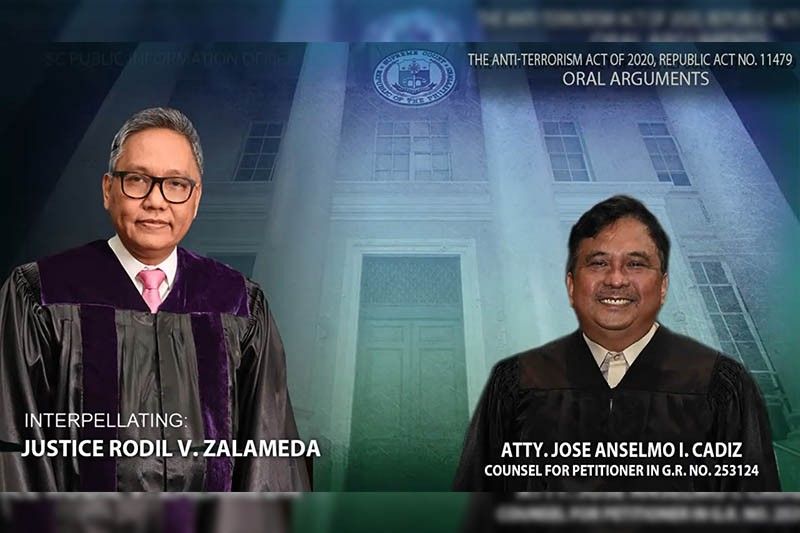Justices ask: Should preparatory acts for terrorism be punished?

MANILA, Philippines — Debates on the Anti-Terrorism Act petitions on Tuesday centered on the preparatory acts punished under the law and whether or not they should be.
As the SC wrapped up its interpellation of the petitioners, Associate Justice Mario Lopez asked University of the Philippines Criminal Law professor Theodore Te whether is it necessary for the legislature to pass a law penalizing a preparatory act.
Lopez said that the legislature should be given leeway in addressing offenses that develop quickly over time and the discretion to anticipate crimes to be committed in the future.
Te said a preparatory act is not punishable “because it may not be clear on intent or what the resulting felony or crime.”
He added that while it is lawmakers can exercise their powers to legislate, “it does not, by that token, survive constitutional review.”
Lopez pressed: In terrorism law, is it necessary for the legislature to penalize a preparatory act?
“This is like rebellion, this is like treason, there's terrorism. That is why at the nip of the bud, we should quell before it happens. Therefore, even a mere tendency, a mere imminence of such crime, the legislature can already stop, or otherwise we might be left behind,” he said.
Associate Justice Rodil Zalameda has also touched on preparatory acts penalized under the ATA. These are found in from Section 6 to 14 of the law, which punishes planning; conspiracy; proposal and inciting to commit terrorism, among others.
Zalameda asked former Solicitor General Jose Anselmo Cadiz why such inchoate crimes, or acts taken towards the commitment of a crime, qwew included in the ATA.
Cadiz said he believes these offenses are included simply to give the Anti-Terrorism Council broader disgression.
Zalameda said it is not for that, but in deference to the requirements of United Nations Security Council Resolution 1337 and the other UN Security Resolutions. “It is for prevention and deterrence,” the justice said.
But Cadiz asserted that he believes there must be overt actions.
The justice pressed: Does this mean “we have to wait for some overt acts before we arrest a person who is committing terrorism, conspiring to commit, proposing to commit, inciting to commit terrorism. We have to wait?”
Cadiz replied: “I disagree. As I said, with good intelligence work and with good police work we can be able to prevent these things from happening.”
Captain Ri crash lands in Padre Faura?
For a few seconds, it was thought that North Korean Special Forces captain Ri Jeong Hyeok had crash landed in Padre Faura in Manila, when Associate Justice Amy Lazaro-Javier asked UP Constitutional law professor John Molo whether he knows a certain “Captain Ri.”
Molo answered in the affirmative. Although he did not explain, a certain Captain Ri, played by Hyun Bin, is known have captured the heart of South Korean heiress Yoon Seri, played by Sohn Ye Jin, and thousands who watched South Korean drama hit "Crash Landing on You".
But the justice was referring to certain Captain Ri of the Armed Forces of the Philippines, posted in Metro Manila.
Lazaro-Javier illustrated: Ri receives an anonymous call informing him that in an hour, five hospitals for children will be blown up with two bombs. An IT genius residing in Raven Street, in Blue Valley Executive Village, Cainta, right outside Metro Manila, will detonate these bombs at the same time with just a press of a button on their cellphone.
During the call, that person is staying in his or her house while coordinating with his or her co-conspirators. What would Captain Ri do?
Molo replied: “He should exhaust what is available under the ATA to stop the terrorist act from happening.”
Lazaro-Javier stressed that Captain Ri, on the ground, has to make a quick decision on what he thinks is the best remedy.
If she was in Captain Ri’s place, Lazaro-Javier said she would summon all her people to evacuate the children patients in the hospital and, at the same time, call for bomb experts to defuse the explosives. She would also dispatch people to secure houses on the same street where the person who controls the bombs resides, restrain them and confiscate their phones.
She would also apply for detention authority, since she cannot yet determine who among the residents of Raven Street is the bomber but she also cannot risk releasing any of them. She added she also has to look for that anonymous caller and convince them to come forward as a witness.
Molo agreed that the justice’s action are more than correct.
Lazaro-Javier concluded: “So in closing, professor, allow me to say this. Unlike the fictional character of Captain Ri, you and the rest of the team are true to life patriots."
Recaps of the four days of the oral arguments may be read here, here, here and here.
- Latest
- Trending































